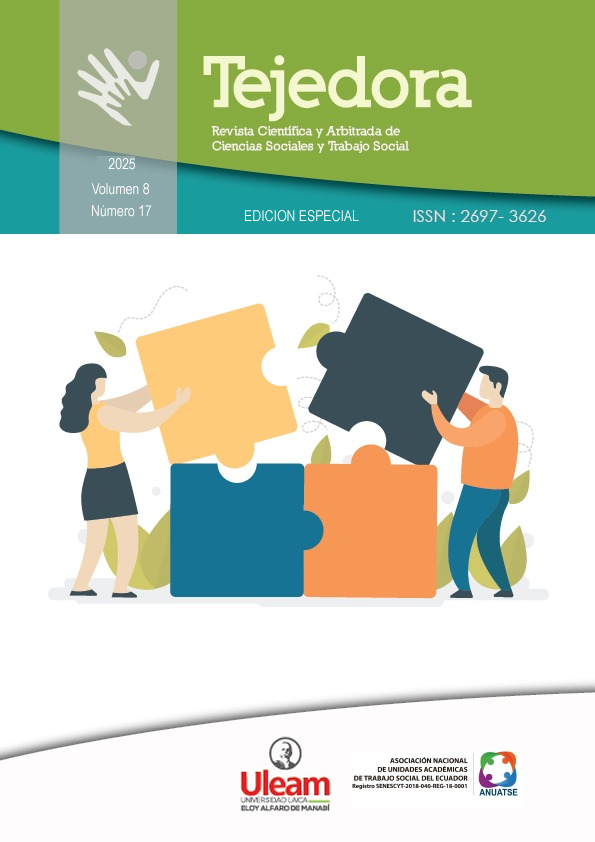SUPPORT NETWORKS FOR WOMEN VICTIMS OF VIOLENCE: AN ANALYSIS FROM THE SOCIAL WORK OF THE FEMINIST ACTION CENTER
DOI:
https://doi.org/10.56124/tj.v8i19.039Keywords:
Gender violence, support networks, social workAbstract
This study examines the impact of support networks on women who have faced gender-based violence at the Violeta Comprehensive Care Center "Feminist Action" from a social work perspective. It aims to determine the influence of support networks on women victims of gender-based violence treated at the Violeta "Feminist Action" Center in the city of Loja. A mixed methodology was applied for this purpose, using a descriptive approach and a cross-sectional design. At the Violeta Comprehensive Care Center "Acción Feminista," 30 clients and a social worker participated. Semi-structured interviews were conducted, the Multidimensional Scale of Perceived Social Support was used, and a checklist was implemented to identify the different forms of violence. Symbolic, political, gynecological-obstetric, and psychological violence was detected. Individual attitudes clearly included justifying and minimizing violence. Regarding family influences, a history of domestic violence (physical, psychological, or verbal) or having witnessed violence in childhood was noted. Regarding support networks, the women reported a low level of support, with their peer group being the most prominent. The importance of social work, which implements care protocols and organizes support groups, is highlighted. In conclusion, the need to strengthen both formal and informal networks, promote awareness campaigns, and advocate for public policies that guarantee comprehensive and continuous care for victims is emphasized.
Downloads
References
Álvarez, D. (2024). Teoría de la indefensión aprendida y violencia de género. Revista Latinoamericana de Psicología,, 123–138.
Benavides, J. R. M., Villena Morales, M. A., & Vargas Estupiñan, E. J. (2020). Redes de apoyo en mujeres víctimas de violencia: Un estudio desde el modelo transgeneracional. Revista
Bronfenbrenner, U. (1987). La ecología del desarrollo humano. Paidós., 1.
Bourdieu, P. (2001). La dominación masculina. . Anagrama., 1.
Estrada, A. T. (2012). Redes de apoyo en mujeres víctimas de violencia de pareja. Revista de Ciencias Sociales, 85–102.
INEC. (2019). Encuesta Nacional sobre Relaciones Familiares y Violencia de Género contra las Mujeres. Instituto Nacional de Estadística y Censos del Ecuador., 2.
León-Guzmán, M. (2019). El papel de las redes de apoyo en la recuperación de mujeres víctimas de violencia. evista Trabajo Social Hoy,, 45–60.
Luizaga, M. R. (01 de abril de 2024). La disciplina de trabajo social y su intervención en la violencia de genero. Revista Multidisciplinaria Volumen, 48 - 58. Obtenido de https://revistacriterio.org/index.php/criterio/article/view/108/289
ONU. (enero de 2011). MONITOREO Y EVALUACIÓN DE INICIATIVAS SOBRE LA VIOLENCIA CONTRA LAS MUJERES Y LAS NIÑAS. Obtenido de PATH A
Piloso-Moreira, L. &.-A. (2022). Redes comunitarias de apoyo y atención a la violencia de género en Ecuador. Revista Estudios Sociales,, 25–40.
Muñoz-Cobos, F., Burgos-Varo, M. L., Carrasco-Rodríguez, A., Martín-Carretero, M. L., Río-Ruiz, J.,
Salud., O. M. (2021). Violencia contra la mujer. OMS, 1.
Seligman, M. (1975). Helplessness: On Depression, Development, and Death. W.H. Freeman., 1.
Trujillo, H. M.-C. (2010). Evaluación de la potencia explicativa de los grafos de redes sociales clandestinas con UciNet y NetDraw. Universitas Psychologica, 67-78.
Walker, L. E. (1979). The Battered Woman. Harper and Row, 1.
Published
How to Cite
Issue
Section
License
Copyright (c) 2025 Revista Científica y Arbitrada de Ciencias Sociales y Trabajo Social: Tejedora. ISSN: 2697-3626

This work is licensed under a Creative Commons Attribution-NonCommercial-ShareAlike 4.0 International License.






















